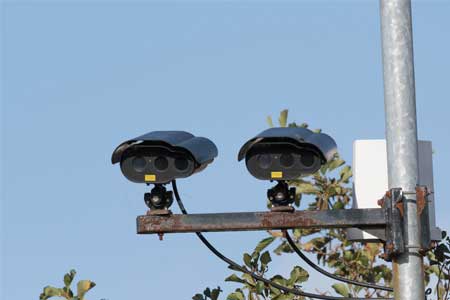13th August 2020 | Justin Godfrey-Cass, Business Development Manager
Cellular connectivity for ANPR

Justin Godfrey-Cass, Transport Solutions Business Development Manager
Fixed line infrastructure is typically the default method of connectivity for Automatic Number Plate Recognition (ANPR), the technology relied upon when it comes to helping police forces in criminal investigations and traffic enforcement. Designed to help forces detect, deter and disrupt crime at all levels, ANPR is used for time-critical issues and is responsible for relaying information about the location of vehicles of interest back to the police.
With that in mind, while the use of fixed line network infrastructure in ANPR’s connectivity can be useful for police forces, many are now turning to cellular networks for further flexibility and cost efficiency while remaining secure. For example, the UK’s second largest police force, West Midlands Police, recently approached Wireless Logic to deliver a comprehensive ANPR platform, built on cellular connectivity that is fit-for-purpose and highly scalable, and is seeing great success through a highly cost effective system.
Police forces are increasingly turning to cellular connectivity either to replace a fixed line network connectivity or as back-up. There are three key reasons behind the move: cost, network flexibility and security, all three of which can come together to create a more suitable solution for tracking vehicles.
Keeping Costs and Disruption Down
 Total cost of ownership should be a key consideration when it comes to choosing between fixed line and cellular connectivity. Usage can be cheaper with fixed lines, but maintenance and infrastructure costs tend to be significantly more expensive and over a long period of time, the total cost of ownership becomes higher.
Total cost of ownership should be a key consideration when it comes to choosing between fixed line and cellular connectivity. Usage can be cheaper with fixed lines, but maintenance and infrastructure costs tend to be significantly more expensive and over a long period of time, the total cost of ownership becomes higher.
Logistically, fixed lines can also be difficult to deliver. Because of the locations of some ANPR cameras, fixed line network connectivity is not always easily available, and many forces operate deployable ANPR for short term periods – deployed quickly and removed a short while later. A fixed line simply wouldn’t make sense in that instance.
Contrastingly, cellular connectivity can be deployed in days at a fraction of the cost and offers police forces the ability to use mobile ANPR – in-vehicle. Cellular connectivity provides much more flexibility, which is more suited to deploying devices for short term periods, such as events.
Flexibility for Efficiency
Access to fast and reliable data transfer on a rapid deployment basis is paramount for police forces, who need to be operating at maximum operational efficiency wherever possible. ANPR cameras are a hugely important piece of equipment in the pursuit of criminals. Registration numbers are read and cross-checked against database records instantly, and it allows police officers to track crimes, playing a significant role in helping to speed up investigations. With that in mind, the speed of data transmission needs to be immediate and reliable at all times. As such, the networks on which they operate need to offer that speed and reliability.
Through cellular connectivity, that platform is in place. Cameras can be set up with primary and backup networks to fill in any gaps in signal strength or coverage, all of which can be managed through a single platform. Where fixed lines present a single point of failure, a cellular connection can allow devices access to multiple networks in different locations. Typically, these cameras use 4G networks due to bandwidth requirements of the application. However, despite the use of different networks and varying bandwidth needs, everything can be managed simply, without complications, through Wireless Logic’s SIMPro platform – which manages all networks through a single interface, keeping things simple at all times.
SIMPro came in highly useful for West Midlands Police from a control perspective. Wireless Logic’s SIM provisioning and control platform was integrated into the overall solution so that West Midlands Police can now individually monitor and control data usage in real-time, setting up alerts and instructions when thresholds across multiple networks are reached.
Staying Secure
Any IoT application needs security measures in place to protect against unauthorised access. Each ANPR camera records and transmits data about every vehicle that passes it. This, along with the high level of responsibility that police forces have when it comes to handling public data, means that the secure transmission of data is a top priority for ANPR.
 Cellular IoT devices are able to leverage private network technology, such as certified VPNs and direct physical interconnects in data centres, to help layer security for devices, networks and all data encompassed within. With security being of absolute importance, finding the right partners and solutions is critical. Wireless Logic holds an ISO27001 certification, and closely follows best practice guidance offered by the National Cyber Security Center (NCSC), demonstrating our commitment to information security excellence and continuous improvement.
Cellular IoT devices are able to leverage private network technology, such as certified VPNs and direct physical interconnects in data centres, to help layer security for devices, networks and all data encompassed within. With security being of absolute importance, finding the right partners and solutions is critical. Wireless Logic holds an ISO27001 certification, and closely follows best practice guidance offered by the National Cyber Security Center (NCSC), demonstrating our commitment to information security excellence and continuous improvement.
West Midlands Police’s previous ANPR setup used individual VPN tunnels to each device that required complex management to achieve links in, as well as the termination of data directly to its internal network. From a data security perspective, this was unsatisfactory. The force was essentially using an adapted mobile solution with high latency levels.
To combat this complex management (and the costs that came with it), Wireless Logic employed a single VPN terminating at a secure endpoint outside of the corporate network. This was achieved through NetPro – a single encrypted and highly resilient platform with dual-failover, sitting across all of the major MNOs within the UK.
The Future of ANPR
We’ve started to see more police forces transition towards cellular connectivity in order to lower costs, improve connectivity and keep data secure. Within public sector agendas, security, cost management and resilience are all top priorities. Through cellular connectivity, authorities can easily implement fit-for-purpose camera connectivity solutions, all deployed across a single, safe, cost-effective platform; it should certainly be a consideration for police forces looking to improve their ANPR systems.
Find out more about our connectivity solutions for ANPR, or get in touch to discuss with our connectivity experts.


